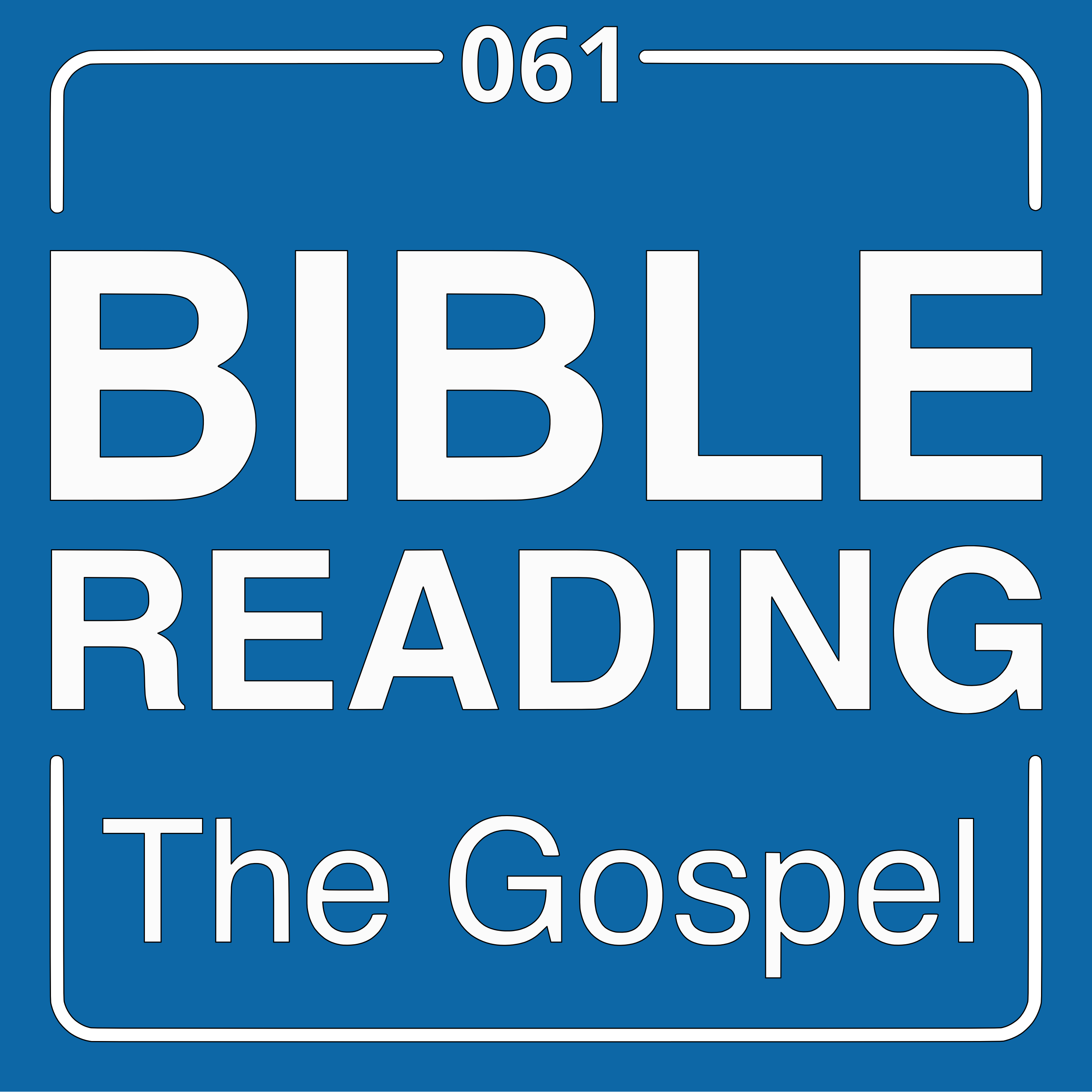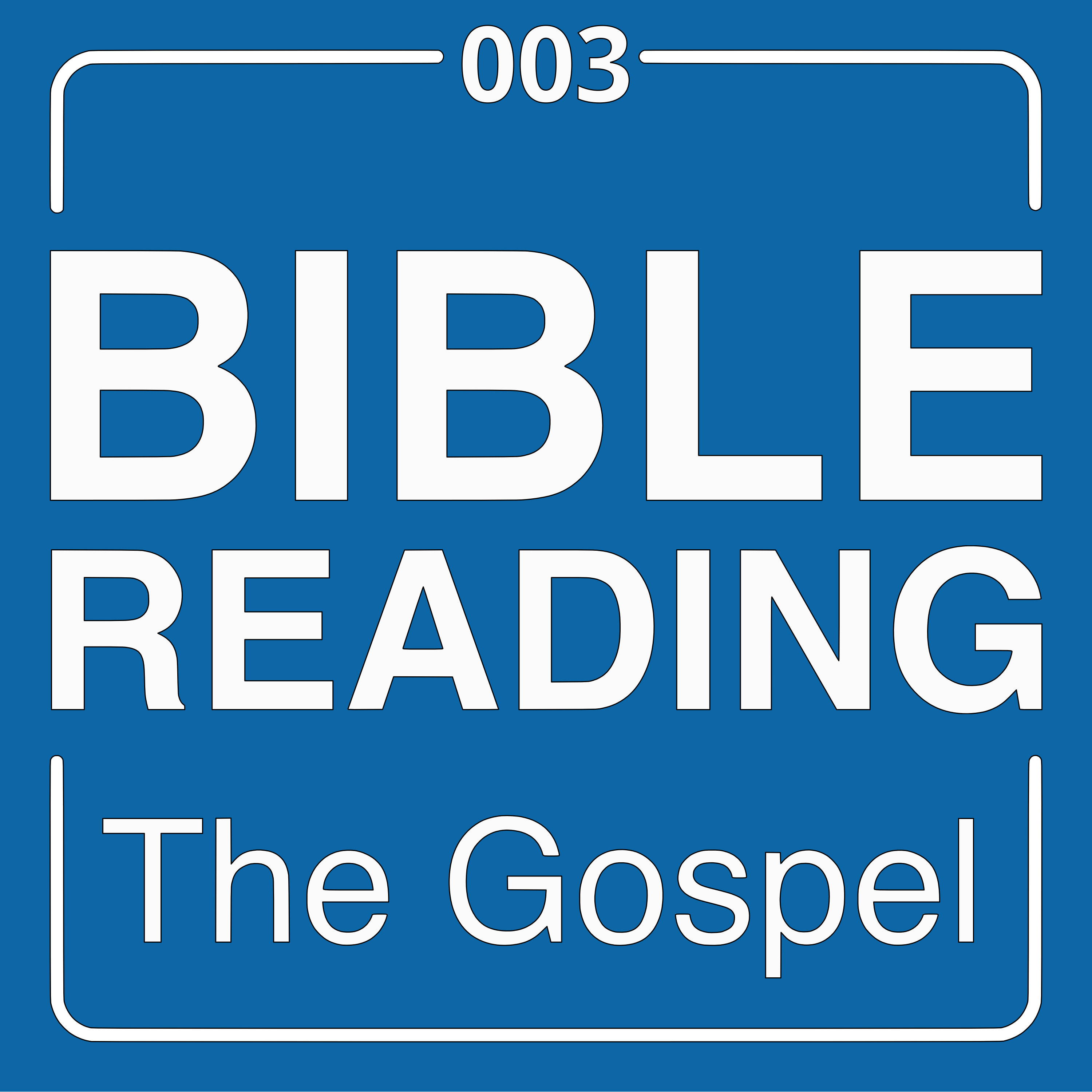Episode Transcript
[00:00:24] Speaker A: Hi, I'm Josh.
[00:00:25] Speaker B: And I'm Gabriel.
[00:00:26] Speaker A: And today on reading the gospel, we are studying an episode about the materialism trap. This is how we live, with abundance. How do we deal with abundance? This episode is taken from the Gospel of Luke, and we're going to start in chapter 13 and read all the way down to 34. Follow along with us.
[00:00:51] Speaker B: Someone in the crowd said to Jesus, teacher, tell my brother to divide the inheritance with me. But he said to him, man, who made me a judge or arbitrator over you. And he said to them, take care and be on your guard against all covetousness, for one's life does not consist in the abundance of his possession.
And he told them a parable, saying, the land of a rich man produced plentiful. And he thought to himself, what shall I do? For I have nowhere to store my crops. And he said, I will do this. I will tear down my barns and build larger ones. And there I will store all my grain and my goods. And I will say to my soul, soul, you have ample goods laid up for many years. Relax, eat, drink, be merry. But God said to him, full this night, your soul is required of you. And the things you have prepared, who will they be?
So is the one who lays up treasures for himself and not rich toward God.
[00:02:15] Speaker A: And he said to his disciples, therefore I tell you, do not be anxious about your life, what you will eat, nor about your body, what you will put on. For life is more than food, and the body is more than clothing. Consider the ravens. They neither sow nor reap. They have neither storehouses nor barn, yet God feeds them. Of how much more value are you than the birds? And which of you, by being anxious, can add a single hour to his span of life? If then you are not able to do as small a thing as that, why are you anxious about the rest? Consider the lilies, how they grow. They neither toil nor spin. Yet I tell you, even Solomon in all his glory was not arrayed like one of these. But if God so clothes the grass which is alive in the field today and tomorrow is thrown into the oven, how much more will he clothe you, o you of little faith, and do not seek what you are to eat and what you are to drink, nor be worried. For all the nations of the world seek after these things, and your father knows that you need them. Instead, seek his kingdom, and all these things will be added to you. Fear not, little flock, for it is your father's good pleasure to give you the kingdom, sell your possessions and give to the needy. Provide yourselves with money bags that do not grow old with a treasure in the heavens that does not fail. Where no thief approaches and no moth destroys. For where your treasure is, there your heart will be also.
So, Gabriel, this is a message that I think is very relevant for those of us who live in America, a country that has excess of wealth and abundance. And even though we've gone through a time with high inflation and people feel like their budgets are tight and raises are not going up, we still have so much around us and we're still so blessed that I don't think we realize how blessed we are. Is that a problem?
[00:04:44] Speaker B: This is the western civilization that we have worked hard for centuries to build, and we are proud of it. But as part of this package of western civilization, there are many traps, and one of them is this trap of materialism.
It is leaning on what we can produce. It is focusing and measuring our success by the abundance of goods and services and products and gadgets, know houses and cars and land, whatever we produce.
[00:05:25] Speaker A: In Leviticus, God talks about how our wealth, our abundance, comes from him.
And I think in America we get the feeling that I earned it, I did it. I went to college. I earned the degree. I sat through classes. I slaved. I've worked 10 hours yesterday and however many hours I did all this work. So this is mine. And I don't think we give God the credit he deserves.
[00:05:55] Speaker B: So this is the essence of Christianity, and this is the message of the gospel. When Jesus says, come to me, focus on me. And Christianity is built or revolves around the person and the ministry of Jesus Christ, he gives meaning to our life and purpose and direction.
The opposite of Christianity that can be found in many pagan religions as well as in unconverted hearts. Even of those who attend church is self reliance, self focus. It is like this guy in this parable. He talks to himself. It seems that he doesn't have other friends. He's just him and himself.
He talks to himself and he surrounds himself with abundance of material possessions. And this is how Jesus illustrates the reality of our western society today.
[00:07:01] Speaker A: And all this starts with this person coming to Jesus and saying, hey, Jesus, make my brother divide up the inheritance.
Give me what he owes me. I think it's probably one of the sadder parts of my job as pastoral ministry. When we do a service for someone, when someone in the church loses a loved one, and then the family fights over the inheritance. And it is sad how many families get torn apart over stuff.
I'm thinking of one family in particular. They were super close. They spent time together, brother, sister, every weekend they were at one another's house, and there was a piece of land out in West Virginia. No one was doing anything with it. But when the mother passed away, they fought so bitterly over it. And they both came and talked to me about how they wished it would be solved and shared this. They shared it around, so it was public knowledge, but it destroyed their relationship over an inheritance. And Jesus is telling this man, take guard against all covetousness.
You might feel that you are owed this money. You might feel that this belongs to you and you've been wronged. But even in trying to acquire something that we feel we deserve, we can be in trouble and in danger of materialism and covetousness.
[00:08:34] Speaker B: I like to take your thoughts a little bit further. Can I bounce it back and ask you a question?
In the Gospel of John, chapter five, Jesus said that all the judgment was given to the Son, all of it. If you want to take some it away, if you want to substitute for Christ, that is, you become an antichrist. Right in place of Christ here.
When this man says, tell my brother to divide inheritance, jesus says, who made me a judge over you?
So how do you reconcile those two statements? All the judgment was given to Christ on one side. And here, nobody made me a judge over you.
[00:09:18] Speaker A: Well, he's not saying no one. He said, who?
And I think if you look at the second part that we read, 22 through 34, God's going to provide.
If this man answered the Father made you the judge, because that's the answer to this question, who made me the judge? The Father. And when you look at the answer, don't worry about tomorrow, don't worry about your stuff. Your father in heaven knows you need it, and he's going to take care of you.
[00:09:50] Speaker B: Beautiful.
[00:09:51] Speaker A: I don't know if that's the answer you were looking for, but that's my answer to that question.
[00:09:56] Speaker B: So if that man had a relationship with a heavenly father, he would not have asked this question. He would have received the response through that personal relationship with God.
[00:10:09] Speaker A: But I think this man thought Jesus was saying, who am I to judge over my. Because like you said, we think of this as Jesus is saying, I'm not the judge.
As we read that question. But like you said, bringing John five in.
[00:10:26] Speaker B: And also this man was trying to execute or to make Jesus Christ execute his mission at a very superficial level.
Or if we read the end of this event, the second part of the reading, Jesus Christ is going deep. He's going deep in the heart, deep in life. Everything is boiling down to simplicity, to whatever God gives you. The most important thing that God gives us is his kingdom. It is the Father's pleasure to give his kingdom to anyone.
[00:11:02] Speaker A: So if we're going to step away from materialism and do what Jesus says in here, lay up riches in heaven, sell our excess and give it to the poor, work with the needy around us, if we're going to do these things, do these promises still hold true today? I mean, is God really going to send a raven to our doorstep if we need food?
We live in a land with everything. Can we rely on God to feed us?
[00:11:35] Speaker B: In essence, yes.
We say three times a day, heavenly Father, please give us today our daily bread. And we believe that, I hope. Yeah. What God requires from us in this event is to refocus from us, from talking to us about us as the guy in the parable, to other people, to those who are in need.
This refocus will change the perspective of life, will move us from pleasure to happiness, from dopamine to serotonin, will give purpose for what we do. And we'll ask God to give us more so we can have more to share with other people.
[00:12:26] Speaker A: And the truth is, we need very little.
We might think, well, I need a car, I need a cell phone, I need a job, I need a house, I need lunch. We might think we need all those things, but we need very little to survive.
[00:12:47] Speaker B: In fact, Tolstoy, one of the greatest writers ever, wrote a beautiful story with a title, how much land a person needs.
And the story that I might have repeated several times, it's very dear to my heart, is how a guy, a poor guy, kind of sold everything he had, made some money to buy food for a long trip. And when he finished the trip in the new country, the owners of the land would give you as much land as you can circle by walking in one day from sunrise to sunset. And this guy wanted more land. He started running and he didn't have the equipment, had to give up his boots and run barefoot and storms and undeveloped terrain. And he ended up that day falling dead on the ground, feet away from the finish line. And they digged the hole that we say here in America, six by 2ft, and buried him there. And that is the amount of land a person needs.
[00:14:09] Speaker A: So what can we take out of this passage for us today? Leave us with a parting thought.
[00:14:18] Speaker B: The fundamentals of life, that is a relationship with a heavenly father, that is receiving and embracing and living in God's kingdom and basic necessities to maintain life, from food to clothing to shelter to relationships. All of them are being provided. And David said, I was young and I am old, but I have not seen the righteous people begging for their bread that is given as it is promised in the Lord's prayer.
[00:14:55] Speaker A: Let us pray. Father God, I pray that we will focus on those things that are important, storing up treasure in heaven, ministering to those around us, honoring you, and that we won't get caught in the trap of materialism, that we won't be running the rat race trying to one up the next person or have the latest thing. I pray, Father, that you remove from us the desire for excess and that our eyes can turn to you. We ask these things in Jesus name. Amen. Amen.



